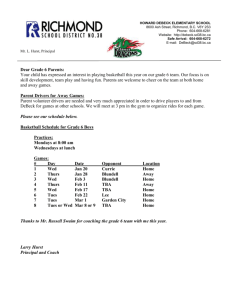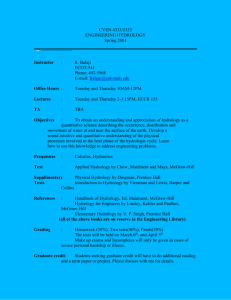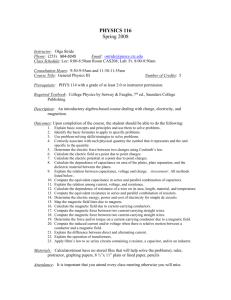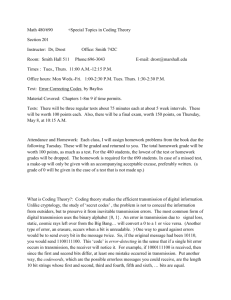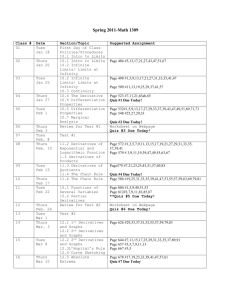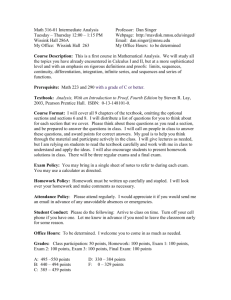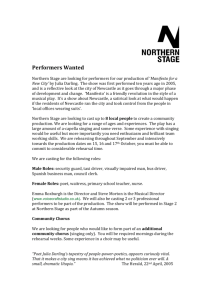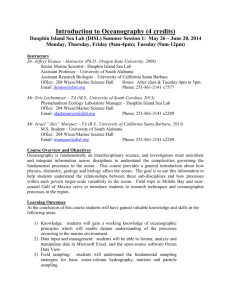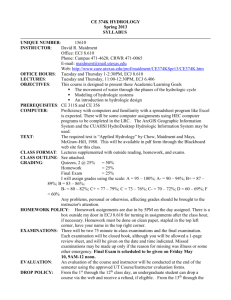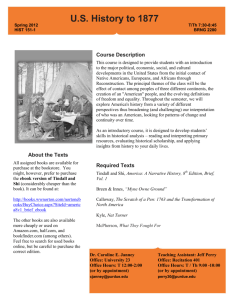Ocean Ecosystems: Ocean Sciences 142/242 and Biology 142/242
advertisement
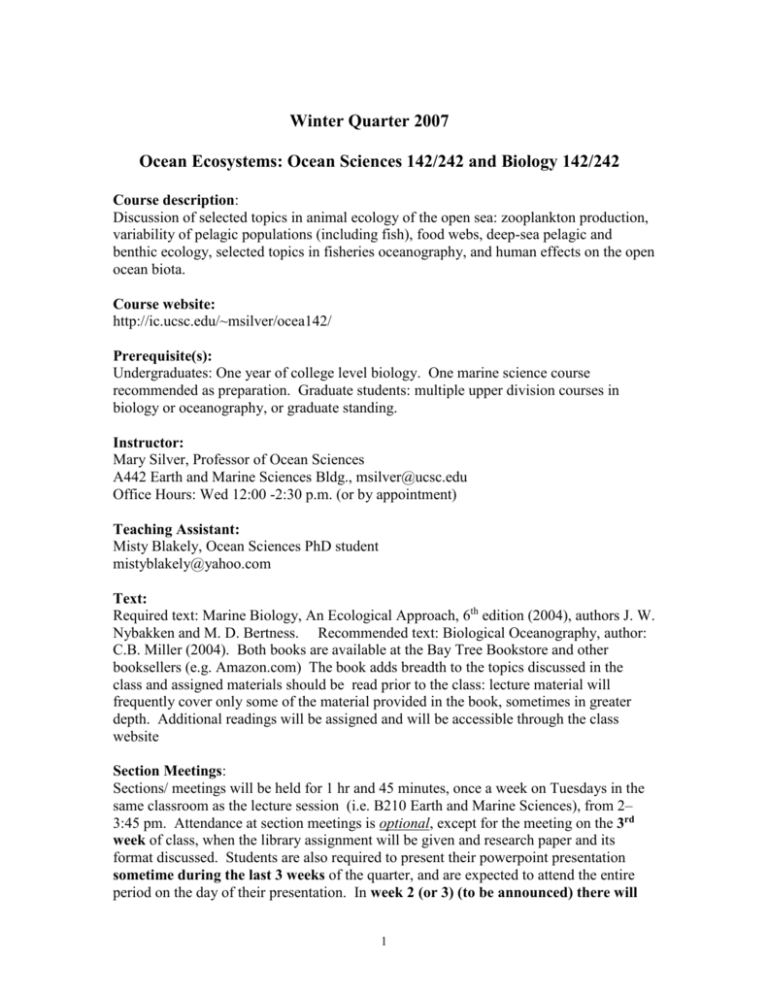
Winter Quarter 2007 Ocean Ecosystems: Ocean Sciences 142/242 and Biology 142/242 Course description: Discussion of selected topics in animal ecology of the open sea: zooplankton production, variability of pelagic populations (including fish), food webs, deep-sea pelagic and benthic ecology, selected topics in fisheries oceanography, and human effects on the open ocean biota. Course website: http://ic.ucsc.edu/~msilver/ocea142/ Prerequisite(s): Undergraduates: One year of college level biology. One marine science course recommended as preparation. Graduate students: multiple upper division courses in biology or oceanography, or graduate standing. Instructor: Mary Silver, Professor of Ocean Sciences A442 Earth and Marine Sciences Bldg., msilver@ucsc.edu Office Hours: Wed 12:00 -2:30 p.m. (or by appointment) Teaching Assistant: Misty Blakely, Ocean Sciences PhD student mistyblakely@yahoo.com Text: Required text: Marine Biology, An Ecological Approach, 6th edition (2004), authors J. W. Nybakken and M. D. Bertness. Recommended text: Biological Oceanography, author: C.B. Miller (2004). Both books are available at the Bay Tree Bookstore and other booksellers (e.g. Amazon.com) The book adds breadth to the topics discussed in the class and assigned materials should be read prior to the class: lecture material will frequently cover only some of the material provided in the book, sometimes in greater depth. Additional readings will be assigned and will be accessible through the class website Section Meetings: Sections/ meetings will be held for 1 hr and 45 minutes, once a week on Tuesdays in the same classroom as the lecture session (i.e. B210 Earth and Marine Sciences), from 2– 3:45 pm. Attendance at section meetings is optional, except for the meeting on the 3rd week of class, when the library assignment will be given and research paper and its format discussed. Students are also required to present their powerpoint presentation sometime during the last 3 weeks of the quarter, and are expected to attend the entire period on the day of their presentation. In week 2 (or 3) (to be announced) there will 1 be a session to view plankton on microscopes set up in the lab - Rm D266 on Friday : all students are advised to attend sometime during the lab, which will be open for several hours that day. The regular section meetings will present some new and/or additional material to help clarify or amplify lecture material, and will provide a forum for questions and further discussion about the lecture material. Paper: A paper based on library research on a topic of the student’s choosing is required (see Grad vs. Undergrad Credit, below). Students will be required to complete a library assignment early in the quarter to insure they learn the necessary tools for researching a subject through the scientific literature. The topic for the paper must be approved by the instructor and is the basis for the student’s presentation in section. The paper is an indepth treatment of a topic related to the subject matter of the course. It should be carefully chosen both to match the student’s interest and to allow the student to find sufficient numbers of primary research papers on that topic. (Very broad topics are not encouraged.) Papers should thoughtfully review the subject, putting the topic in a broader perspective but also delving deeply into some of the latest discoveries and should use primary research literature (i.e. journal articles) as well as broader reviews of the subject. Papers written for this class must be used exclusively for this class: students may not submit a paper that is receiving credit in another class. Papers are due on the last lecture day of class (Thurs, Mar 16th). Basis of Evaluations: Students will be evaluated on the basis of their 3 midterm exams (17.5%, 17.5%, 25%for 1st, 2nd, 3rd exams, respectively), library assignment (5%) research paper (25%) and verbal presentation, based on their research paper topic (10%). The material covered in the exam will be based on material presented in lecture: material in the assigned readings that is not discussed in the class will not be the subject of exam questions. There will be question/answer session given by the instructor (Silver) on an evening prior to each exam, normally the evening the night before the exam. Graduate versus Undergraduate Credit for the Class Undergraduate and graduate students will attend the same lectures and have the same exams, except that graduate students may be asked to answer additional questions. Graduate students will write a paper of 8-10 pages, whereas undergraduates will write shorter papers of 5-6 pages in length. The verbal presentation in section for all students must use power point. Graduate students will be given 1-2 additional written assignments during the quarter and they are required to submit drawings/worksheets on their observations in the plankton lab session(s), which will be an introduction to the local plankton. Supplemental Information Ocean Ecosystems is a lecture class that focuses on the pelagic animal topics covered (to a degree) in a typical “Biological Oceanography” class, plus some additional materials usually covered in marine biology or ecology courses. The phytoplankton topics are discussed in greater depth in a separate course, OS 130/230, “Biological Oceanography”) taught by Professor Raphe Kudela in the spring quarter. 2 Tentative Lecture Schedule Week 1 Tues, Jan 8 Review of the plankton, phytoplankton Thurs, Jan 10 Review of the zooplankton Week 2 Tues, Jan 15 Oceanography review (physical part) Thurs, Jan 17 Zooplankton feeding Week 3 Tues, Jan 22 Zooplankton production I Thurs, Jan 24 Zooplankton production II Week 4 Tues, Jan 29 The microbial loop Thurs, Jan 31 Midterm Week 5 Tues, Jan 31 Thurs, Feb 2 Global production Herbivore production: controls Week 6 Tues , Feb 5 Thurs, Feb 7 Food chains, “bottom up vs. top down” controls World Fisheries I Week 7 Tues , Feb 12 World Fisheries, cont,, Monterey Bay example Thurs, Feb 14 “Export production” and the nature of exports Week 8 Tues, Feb 19 Midterm Thurs, Feb 21 The deep ocean environment and biological “constraints” on deep sea life Week 9 Tues, Feb 26 Vertical migration Thurs, Mar 28 Bioluminescence Week 10 Tues, Mar 4 Thurs, Mar 6 The deep sea benthic communities Hydrothermal and cold seep communities 3 Week 11 Tues, Mar 11 catch up Thurs, Mar 13 Human effects on ocean ecosystems Final Exam, Wed, Mar 19, 8:00-11:00 am. No exceptions! 4


